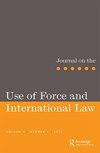(秘密)邀请干预:寻求国际法中关于征得同意使用武力的公开要求
Q3 Social Sciences
Journal on the Use of Force and International Law
Pub Date : 2020-01-02
DOI:10.1080/20531702.2020.1774195
引用次数: 1
摘要
不断演变的冲突实践——朝着远程、轻脚、长期、“流动”干预的方向发展——使得审问一个国家是否同意另一个国家在其领土上使用武力(邀请干预)变得越来越紧迫。在巴基斯坦,美国在秘密同意的基础上进行了长达9年的远程空袭,这引发了一个问题,即有效同意是否包含公开要求。对国家责任、战时法和1944年至今的国家实践的考察表明,尽管同意倾向于公开,但在法律理论意义上,没有足够的证据表明有义务公开。本文认为,没有公开的要求表明,同意并不限制武力的使用,而是使之成为可能,揭示了一种为霸权服务和国家投射权力的学说。本文章由计算机程序翻译,如有差异,请以英文原文为准。
Intervention by (secret) invitation: searching for a requirement of publicity in the international law on the use of force with consent
ABSTRACT Evolving practices of conflict – towards remote, light-foot, long-term, ‘liquid’ interventions – make interrogations into the consent of one state to the use of force by another on its territory (intervention by invitation) increasingly pressing. In Pakistan, the US carried out remote airstrikes for nine years on the basis of secret consent, raising the question of whether valid consent contains a requirement of publicity. An examination of state responsibility, jus ad bellum, and examples of state practice from 1944 to the present shows that, though consent tends to be publicised, in a doctrinal legal sense there is insufficient evidence to suggest an obligation to publicise. This article argues that the absence of a requirement to publicise suggests consent does not restrict the use of force, but enables it, revealing a doctrine that lends itself to the service of hegemony and the projection of power by states.
求助全文
通过发布文献求助,成功后即可免费获取论文全文。
去求助
来源期刊

Journal on the Use of Force and International Law
Social Sciences-Law
CiteScore
1.10
自引率
0.00%
发文量
13
 求助内容:
求助内容: 应助结果提醒方式:
应助结果提醒方式:


